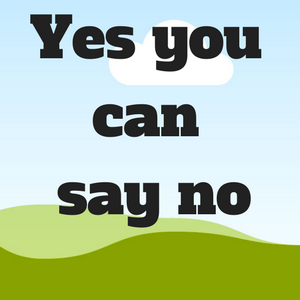
Two Lines That Sum up What I Believe
|
|||

|
|||

For instance, someone asks you to donate to a charity you don’t even believe in, or serve on committee you’re not interested in, or let’s say a nice person asks you out for the evening but you don’t want to go…and you still say OK? Ack!
“But I can’t say no!” I hear you cry. Yes, you can. Of course you can. You just want to know how to say it, without causing offense, disapproval, or upsetting someone.
The problem is you end up doing things that bring you no joy just in order to please someone else, and you’re frustrated with yourself for not saying what you meant. Also, you’re overwhelmed and don’t have time to do the things you want to do.
If only you had some simple rules and phrases that would allow you to speak your mind in a clear and courteous manner. I’ve got them.
Here are 4 artfully assertive rules and phrases to help you just say no in a way that won’t cause offense or put you in the doghouse.
Don’t get mad because they asked, and don’t make them feel bad for asking.
If you don’t say no, it’s your fault, not theirs for asking. Own it. It’s totally up to you to control your own time and energy.

“Thanks for asking, but that’s not really my thing. I’m going to say ‘no’.”
“Thanks for asking, but that’s not going to work for me. I’m just too busy right now.”
“I really can’t—sorry; I’ve got too much on my plate right now.”
They have the right to ask, but they don’t have the right to elaborate explanations or apologies. For the sake of politeness a short sorry, followed by a brief reason, (see above examples, Rule #2) will suffice. You don’t have to justify your decision.
The general rule that keeps me out of trouble is a short ‘sorry’, followed by a brief explanation, combined with a pleasant expression.
Then….

Once you’ve said no, don’t repeat yourself, or start apologizing, adding to your story, or yammering away trying to justify yourself. Just be quiet, hold your nerve, and carry on as before. If you have been courteous, then you have nothing to explain.
Remember these 4 rules next time you are asked for something you don’t feel comfortable with. Honor their right to ask and yours to refuse. Try out these phrases. All my sentences, rules and suggestions are tried and beta tested.
I think you will be delighted with how magically well they work.
If this subject is interesting and relevant to you, there is lots more to enjoy in my book, Artful Assertiveness Skills for Women, available online in Kindle and paperback; if you live in San Miguel, it’s for sale in the Biblioteca bookstore. This easy to read, clear, fun, and concise book could help you in ways you can’t even imagine.
I’d love to hear of your successes! Contact me at margaretnashcoach@gmail.com. and look out for workshops and practice groups on this and similar life coaching subjects.

I’ve lived here for a decade and—thanks for asking— my Spanish is still pretty awful. But my pretty awful Spanish has taught me invaluable lessons in assertiveness that have generated into every aspect of my life. Let me elaborate.
Here in Mexico, especially in the ex-pat community, it’s a big deal how well you know and speak Spanish. It’s the ultimate status symbol. Over the years I’ve had many snide comments directed my way implying I’m either stupid, lazy, arrogant, or ‘just don’t care’ because I haven’t mastered the language. Oh, and don’t mention politically incorrect. I know, I know!
In the past I fell into the big huge bear trap of explaining and defending myself—“Oh I’ve really tried! I’ve had a dozen tutors! I’ve gone to all the classes! I guess I’m just too old, or just haven’t found the right teaching method, blah, blah, blah. I’m not stupid! I’ve got a degree. Something is just really strange about this, blah, blah, blah.”
This never felt good to me, and it never convinced anyone about anything. No one ever validated me or gave me the approval I was so desperately seeking.
This taught me a huge life lesson.
Substitute anything for not learning Spanish: I can’t lose weight, I can’t cook, my house is untidy, we haven’t decorated yet, I can’t do this, I haven’t done that, etc.
I repeat: People will judge you. That’s what they do. Human beings are judging machines. We all judge everybody, all the time, for everything. You can’t stop that so don’t try. You’re wasting your energy.
But you don’t have to fuel it either. Groveling, apologizing, explaining, or justifying fuels judgment, it doesn’t get rid of it. As long as we crave or expect approval from others we’re sunk—it won’t come. So stop trying to get it.
I realized I was playing either the Mouse or the Dragon about Spanish—
I would cringe and crave approval and forgiveness for being such a dunce, or I would get mad. How dare you look down on me! I’ve tried, darn it! I mean, really tried! Neither reaction gave me the elusive result I wanted.
Now I’ve learned to laugh at it. I no longer give explanations to anyone. I only owe them to myself. When it’s time for me to learn Spanish, I guess I will. If that never happens, I guess it won’t. My reasons are mine, not anyone else’s and I don’t owe anyone an apology.
So when anyone criticizes me about anything these days, I think, “That’s interesting. I wonder if they’re right?” I might even conclude they are in which case I say, “Agree! You’re right!” And then I shut up.
I take criticism into account (after all I might learn from it), and then choose my response, if any, rather than reacting emotionally. I avoid being arrogant, and I avoid being a victim.
You can’t imagine how liberating this is.
Excerpt from my upcoming book How to be Artfully Assertive: Skills for Women, which will be available on kindle and in paperback soon, 2017.